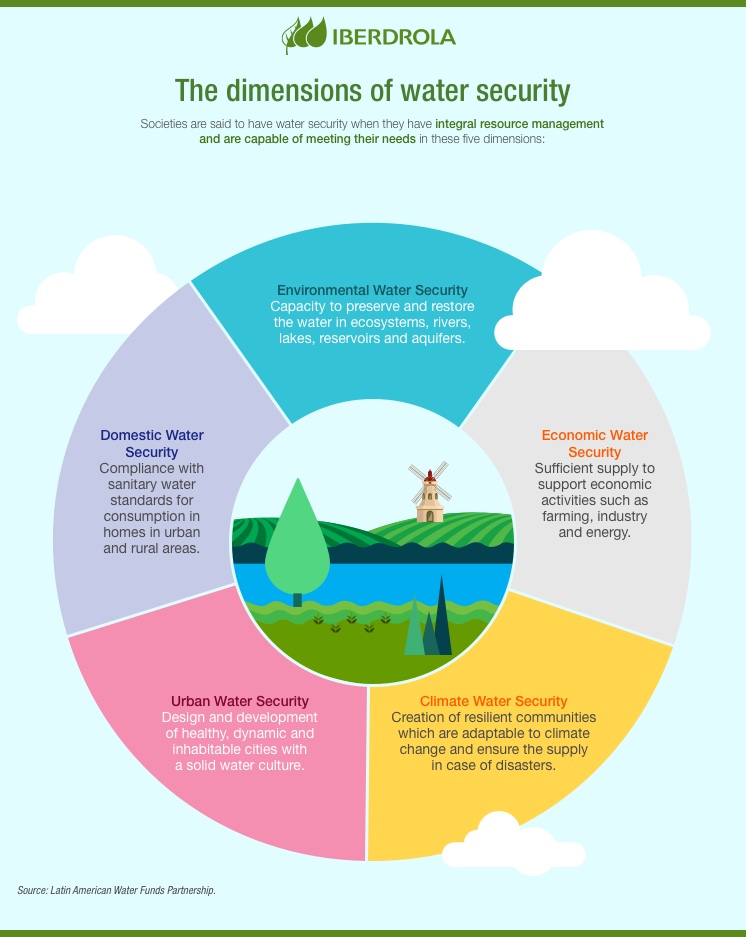Water security
What is water security and how is it threatened by climate change?
Climate change is threatening food security all over the planet, and the same goes for water security. This concept can be defined as the capacity of a society to have enough adequate quality water available. It analyses the condition of surface water and subterranean aquifers and the use made of it with a territorial focus.

Human beings depend on water to survive and their societies have always chosen places with water to build our settlements. In other words, as well as being a basic daily need, we now use it for many more purposes, both traditional, such as farming and more recent requirements such as energy generation (hydroelectric energy).
The importance of water to humankind's survival and development has always been patently clear, but the time has come to look to the future. In this regard, the UN has issued a warning: By 2030, the Earth will have a water deficit of 40% if we do not change our current behaviours. And the fact is that despite the progress we are making regarding responsible use and sanitation of water, demographic growth, and certain other factors, are endangering our water security.
Sustainable use of water
Sustainable water management is among the pillars of the United Nations' Sustainable Development Goals (SDG), specifically SDG 6, which concerns ensuring access to sufficient clean water and sanitation everywhere on the planet. To make this happen, measures are being taken to ensure ubiquitous, fair access to drinking water, reducing discharges to minimise water pollution, protecting quality and increasing the percentage of waste water processing.
Being aware of the need to manage water resources efficiently, ensuring quality and avoiding degradation, are key to ensuring that future water availability is not endangered. A sustainable management model, among other things, requires encouraging water saving, ensuring it is returned to the environment in good condition and guaranteeing supplies through alternative sources. To do this, we must satisfy demand while protecting groundwater and superficial aquifers.
What is water security
Water security is a term that refers to a society's capacity to have enough water of sufficient quality for survival and to carry out different productive activities. Therefore, a society with water security is in a position to reduce poverty and improve living standards.
According to the Global Water Partnership, an international network that promotes sustainable water management, a world with water security "is one where each person is guaranteed water security at an affordable cost to live a healthy, productive life, where communities are protected from floods, droughts and water-borne diseases". What's more, it adds, "water security fosters environmental protection and social justice in the case of conflicts and disputes that may emerge as a result of shared water resources".

Causes of water insecurity
Water security is in danger because of the growth of the world population and its concentration in cities, of the deterioration in water quality due to rising levels of pollution due to human activities — not only atmospheric but also due to the change in land use — and the impact of extreme weather events caused by climate change on water. It is essential to identify and analyse these problems to find sustainable solutions in the future.
Climate change and water security
Climate change is endangering water security. Its effect not only reduces the availability of water but also makes it more variable and unpredictable in many parts of the planet, exacerbating supply problems. Droughts and floods are becoming far more frequent as a result of the extreme meteorological events we have already mentioned. They have severe consequences for rich and poor countries alike. This pattern is becoming increasingly common, severely damaging people's ability to earn a living and traditional production models in many places.
How to be careful with water
Sustainable water management, as we have already said, requires responsible consumption, the fight against degradation and increased recycling, which is essential to preserving our water resources. One essential concept for raising awareness about this type of management is the water footprint, which measures the volume of water used throughout the production chain of a product or service.
Personally, to reduce the water footprint there are simple habits you can adopt, such as: reducing the length of your showers and using water-saving shower heads, reducing your intake of foods that require more water to produce, like meat, not using the WC like a waste paper bin, buying efficient electrical appliances and only running them when fully loaded, watering plants at night so that the water does not evaporate, etc.
Knowing the level of water security everywhere on the planet is essential to guarantee its availability, which is where the Global Water Security Index (GWSI) comes in. This indicator is established based on four criteria: availability, accessibility, security and quality, and has a series of advantages: It includes environmental, social and economic criteria; determines priority areas for attention and a greater risk of conflicts; standardises vulnerability and water risks, etc.




